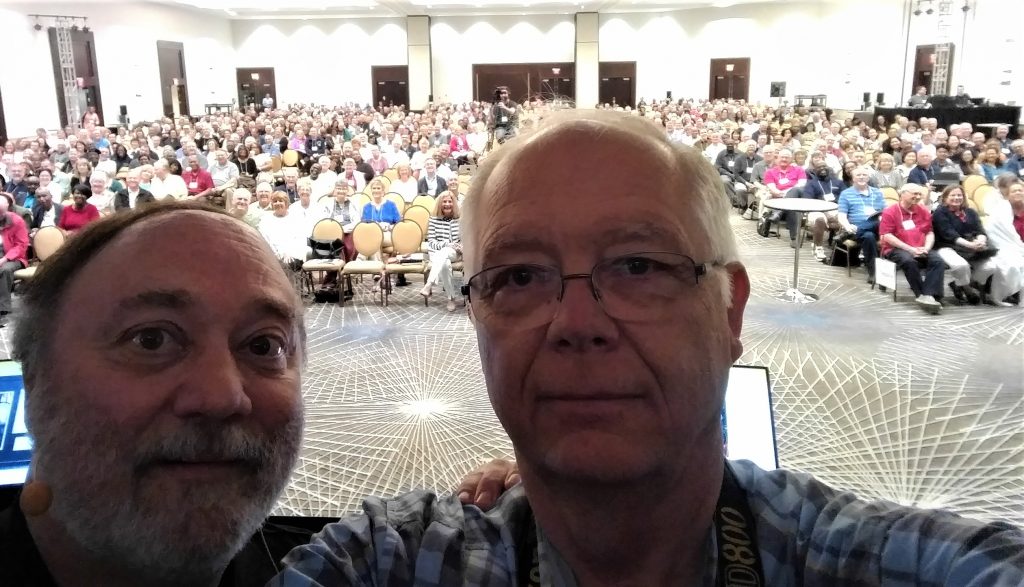Dear Brothers and Sisters,
Tammy and I returned home a few days ago from GCI’s joy-filled Denominational Conference in Orlando. Over 1,000 members and friends attended, coming from 29 countries. Together we celebrated the theme, We Are GCI. In the “selfie” picture below, Pastor Doug Johannsen and I stand on stage at one of the sessions. For more about the conference, click here.
Leadership changes

During the conference, I announced that on January 1, 2019 I will be retiring—stepping aside as President of Grace Communion International. On that date, GCI Vice President Greg Williams will become GCI President. After retiring from GCI employment I will continue serving as Chairman of GCI’s Board of Directors and Russell Duke will continue serving as Vice Chairman.
These changes in our leadership, recently approved by our Board of Directors, will be accompanied by the move in April 2018 of our Home Office from Glendora, CA, to Charlotte, NC. We’re thankful to God for the way he has provided our next generation of denominational leadership, both in our Home Office and in our other GCI offices around the globe. Thanks for your prayers about these transitions!
Humans in relationship
As I near retirement, I often find myself rejoicing that God in his goodness has created us to be humans in relationship. The topic of the nature of humanity has fascinated people down through the ages (and has sometimes led to fanciful speculation). Often, the focus has been on what is called the human “soul.” Heraclitus of Ephesus (535-475 BC) thought the soul was a bodily agent composed of an unusually pure or rare form of matter such as air or fire. Thales of Miletus attributed the soul to magnets because seeing magnets move iron, he assumed they were alive. Plato reasoned that the soul has three parts: “reason” (λογιστικὸν), “spirit” (θυμοειδές) and “appetite” (ἐπιθυμητικόν). In today’s modern (scientific) era, many view the soul as nothing more than the result of electro-chemical activity in the body’s neural networks.
In Genesis 2:7 (KJV), a person is said to become a “living soul” when God breathes into them the “breath of life.” The Hebrew word translated “soul” is nephesh (נֶ֫פֶשׁ), sometimes translated “living being,” “creature” or “life.” The Old Testament uses nephesh in reference to both humans and animals (e.g. Gen. 1:20-30; Ezek. 47:9) and describes death as the cessation of breathing (Gen. 35:18). The Old Testament thus sees the “soul” as the life-possessing quality of humans and animals with God being the source of that life. Indeed, it is God who gives life to all living things.
The Old Testament then differentiates between animals and humans by declaring that humanity has, uniquely, been created “in” or “according to” the image of God. This is further explained in the New Testament where Jesus is shown to be the original image of God—the archetype of the first Adam (Rom. 5; 1 Cor. 15). We are told that all persons were created in, through and for Jesus Christ (Col. 1:15-16). Thus we learn that we were created to be images of The Image, Jesus, the eternal Son of God incarnate.
The New Testament also shows that the Son of God upholds the universe and all that is in it (Heb. 1:1-3). Were he to forget about the universe for even a nanosecond, it would cease to exist. Thus we understand that existence itself involves a real (though impersonal) relationship of the Creator God with his creation through the Son. But that’s not where the story ends. As we know, from the beginning humans cut themselves off from God out of distrust and pride, which bore the fruit of disobedience and alienation. God himself would have to personally intervene to reconcile humanity and redeem us back into personal communion and communication with him so that his original purpose would be realized.
So out of love, the Father sent the Son to grab hold of us down to the roots of our nature so as to free us from bondage to guilt and the power of sin and thus restore us to communion with himself. Because of what Jesus Christ did for us, we now can personally and individually grow in relationship to him and become conformed to his image. This is possible only because of the ministry of the Holy Spirit who enables us to share in the human nature that the Son of God assumed then reconciled, renewed and regenerated through the whole of his incarnate life—from conception through life, crucifixion, resurrection and ascension. The Son of God is not only our Creator and Sustainer—he is our Redeemer!
Through Jesus, we learn that the triune God (Father, Son and Spirit) have existed in a relationship of loving, knowing and glorifying one another before there ever was a creation. Knowing that God is relational, and that Jesus is the eternal Son of the Father, in the Spirit, we understand that we have our being and freedom in that image of being-in-relationship, which starts with Jesus, the Lamb who was slain on our behalf from the foundation of the world. The Bible shows us that from the moment the Triune God spoke everything into existence, we were created by him, for him and in his image to be relational beings—relating to ourselves, to others, and to God. It is no wonder then that Jesus points out that the greatest commandment is to love God and that the second, following that, is to love others.
Whole, complete persons
Noting that the apostle Paul, in 1 Thessalonians 5:23, uses the words spirit, soul and body in describing our humanity, some have mistakenly concluded that these are three separable components. While these terms do refer to distinct aspects of our human selves, they refer to the whole person in different relationships as noted by theologian N.T. Wright:
Just as, for Paul, soma [body] is the whole person seen in terms of public, space-time presence and sarx [flesh] is the whole person seen in terms of corruptibility and perhaps rebellion, so psyche [soul] is the whole person seen in terms of, and from the perspective of what we loosely call the “inner” life…. Paul can use the word pneuma [spirit] to refer to the human “spirit,” by which he seems to mean…the very centre of the personality and the point where one stands on the threshold of encounter with the true god. (The Resurrection of the Son of God, p. 283)
Spirit, soul and body are thus to be understood as descriptions of the various relationships we have with God and one another as persons in relationship. Our spirit involves our relationship to God, our soul is our inner life (relationship to or within ourselves) and our body stands in relationship with the world at large. Theologian Tom Smail explains it this way:
The word psyche plays a different part in Paul’s tripartite description of our humanity than it does in the bipartite approach implied in [Matthew’s] quotation from Jesus [Matt. 10:28], where body stands for our relationships with the world and this present age and soul for our relationship with God and the age to come, and the point is that we can lose the former without losing the latter…. In other words, the terms body, soul and spirit are meaningless apart from the relationships to the world, other people, and God in which the self stands. We are body, soul and spirit as persons and not as individuals, because…we image the God whose own being is not that of a solitary individual, still less of three such individuals, but of Father, Son and Holy Spirit in inextricable relationships with one another, three persons, and one God. (Like Father, Like Son: The Trinity Imaged in Our Humanity, p. 152)
Becoming like Jesus
Understanding our humanity in these holistic ways, I take great delight in Paul’s statement:
Now may the God of peace himself sanctify you completely, and may your whole spirit, soul and body be preserved blameless at the coming of our Lord Jesus Christ. (1 Thess. 5:23, ESV)
Paul understood that God orchestrates our sanctification as whole, complete persons, in spirit, soul and body. We are children of God by nature as well as by adoption who, by the Holy Spirit, are becoming like Jesus, the true image of God. Our Triune God is loving us to perfection so that one day, when glorified, we will receive fully and share completely in all that Christ has accomplished for us, and so become “perfect and complete, lacking in nothing” (James 1:4 ESV). We thus embrace and rejoice in God’s loving work of sanctification by his Word and Spirit.
Forever thankful that Jesus is the author and finisher of our faith,
Joseph Tkach



